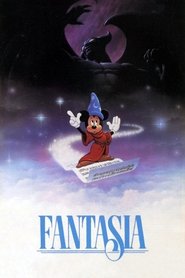The Sorcerer’s Apprentice resonates with its own period, and with a contemporary Hollywood transformed aesthetically and culturally by Jewish émigrés from Europe, including the talented abstract animator on Fantasia, Oskar Fischinger. The horrifying image of the multiplying broomsticks marching in fascist lockstep, their nightmarish shadows cast menacingly on the wall, echoes the topical iconography of Nazi military power. The apprentice has summoned forth a cinematic sequence from Leni Riefenstahl. The powerfully dangerous sorcerer’s book thus resonates with another necromantic volume, Mein Kampf, and its dark arts of national resurgence and racial purity.
— Emma Smith: Portable Magic
Disney rereleased Fantasia at the end of 1969, a year after [Stanley Kubrick's] 2001’s rampant success. 2001 was marketed as “the ultimate trip,” an intentionally nuanced phrase that resulted in high numbers of very high audience members. By referring to Fantasia as “the ultimate experience,” Disney cannily drew on these earlier associations of 2001 with a voyage beyond the stars—and beyond one’s headspace. It became abundantly clear to me as I looked into this moment that the Disney Corporation knew exactly what it was doing: appealing to the turned-on acidhead generation in order to drum up enough interest that Fantasia could finally turn a profit, over twenty years after its first release. It worked. Disney claimed they had no idea what was going to happen, but the timing doesn’t add up. Few things give me greater glee than imagining the secret meetings where buttoned-up Disney execs threw up their hands and acquiesced to better living through chemistry.
— Jocelyn Szczepaniak-Gillece (Film Quarterly)

